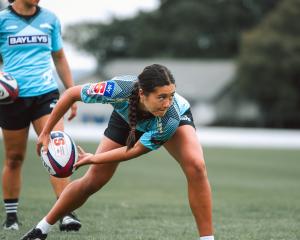Samoa's IRB representative Harry Schuster wants an investigation into former All Black Simon Mannix's allegations that French club Racing Metro paid three Fijian players not to go to the World Cup last year.
"The IRB rules are very clear and should be enforced. The problem of player availability is a recurring issue for the Pacific Islands and smaller nations. If we had the money, we'd have taken someone to court already," said Schuster.
"The IRB have to bring this to a head now, investigate and find out what's going on. Otherwise the same scenario is going to happen again and again. Players should not be put in a situation where they are bullied by rich men into not representing their countries."
Schuster said that players find themselves in a Catch 22 situation where they might want to play for their countries but would be penalised financially by their clubs.
Sireli Bobo and Jone Qovu pulled out of the Fiji squad citing personal reasons, while Josh Matavesi withdrew citing club commitments.
Former Samoan international-turned-agent Freddie Tuilagi said in The Independent that his brothers Alesana, who represented Samoa, and Manu, who represented England, both had their wages docked by 50 per cent at the last World Cup by English club Leicester in a clear breach of IRB regulations.
English players were paid an estimated £50,000 ($97,000) for the duration of the tournament - but cash-strapped Samoa can't pay that kind of money.
Schuster is due to attend an IRB meeting in Dublin this week where issues of player availability will be discussed. IRB
president Bernard Lapasset promised there would be strong sanctions against the Parisian club if found guilty - though no inquiry has yet been launched.
Rugby insiders believe French and English unions have no stomach for a fight with clubs and their powerful owners while rugby's governing body are yet to show any enthusiasm to tackle the issue.
Lapasset acknowledged that there have been rumours of clubs being in breach of IRB's regulation 9 (on player availability) for years. However, no club has ever been brought to book.
They cannot plead ignorance - while Mannix's statement was reported in the Independent earlier this month, his comments were made on the IRB's own radio show, Total Rugby, in January.
French sports daily L'Equipe investigated the claims in May, raising the issue with the IRB who responded in a statement on June 6 that "The IRB can only act on player release issues if requested to do so by a union or if it is provided with credible evidence that would allow it to pursue its own inquiry."
Earlier this month Matavesi confirmed to UK Sky Sports' The Rugby Club that Racing players were paid to remain available for their club and not to play for their country. The IRB then released a similar statement that was amended to say that the source of "credible evidence" needed to come from "a union or recognised rugby body".
But under regulation 9.36, the IRB has the power "to initiate an investigation of its own motion" - there are no caveats as to where the information needs to come from.
Schuster says that if the IRB isn't prepared to enforce its own rules, "there's no hope for us and the other smaller unions - Georgia, Romania, the US - to compete at the same level as the big teams."
The Oceania representative is clearly fed up with the way rugby is run: "I don't believe in the old boys' network. It's time to shake up the system. Governance structures should be reformed. Oceania represents 13 countries, yet I have only one vote. Frankly, I find that strange."
Tier one unions - Six Nations and Sanzar - have two votes each, excepting Italy and Argentina who have only one, as do Japan and Canada. Oceania and the five other regions have one vote each.
The tier one nations have consistently voted themselves additional payments to make up for lost takings in World Cup years: last year they received 4.5 million each, while tier two nations like the Pacific Islands - excluded from major competitions and unable to generate any meaningful revenue - got nothing. In 2015, the additional payment jumps to 7.5 million.
England's RFU are set to make a profit of 17 million from this year's November tests alone; Samoa, unable to cover the costs of hosting tier one sides, lose money when they play at home.
Schuster's patience is running out: "People talk about what Argentina have done, and it's great. But the Pacific Islands teams have the ability to break through as well."
- By John Daniell










